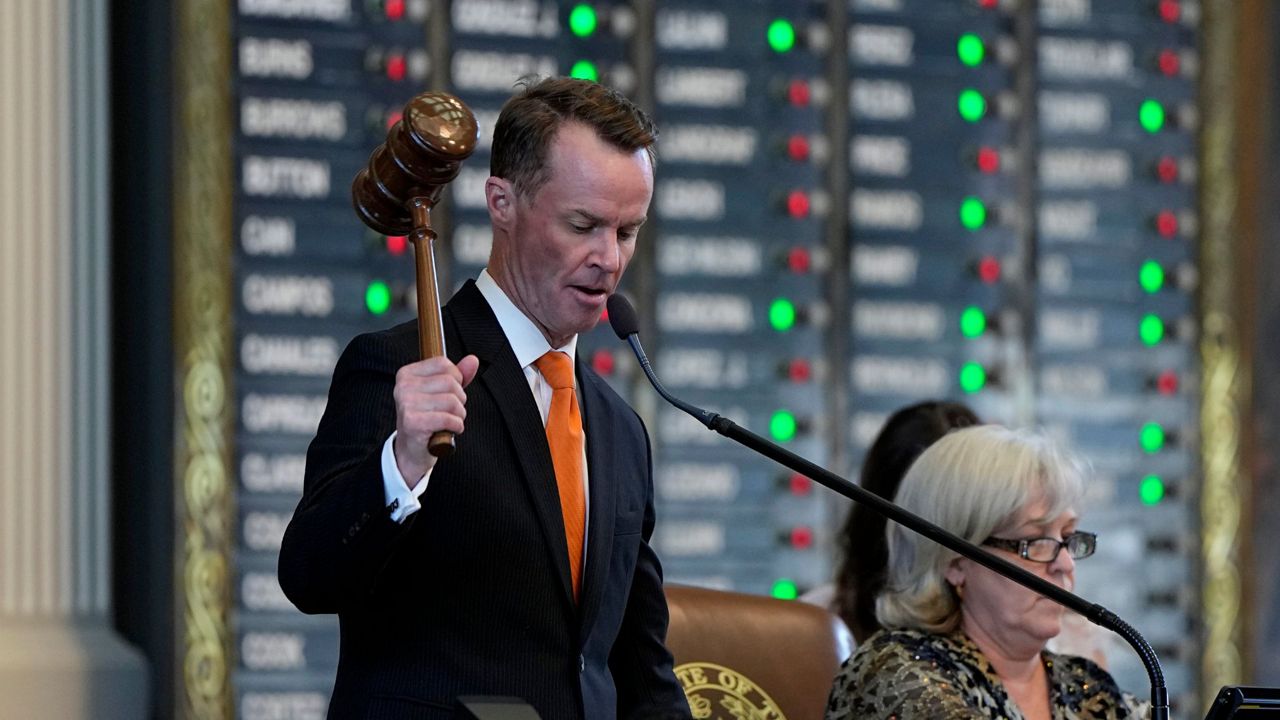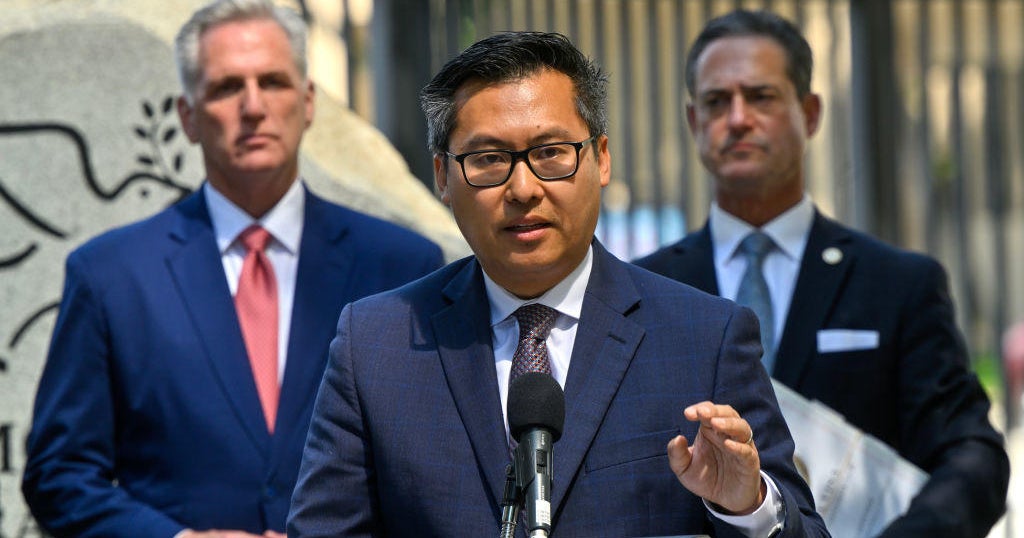Finance
Japan finance chief sees need for stable forex moves amid weak yen

Japanese Finance Minister Shunichi Suzuki on Friday stressed the need for foreign exchange rates to move stably by reflecting economic fundamentals, saying that excessive fluctuations should be rectified.
Speaking at a press conference during his visit to Georgia, Suzuki declined to comment on whether Japan intervened in the currency market when the yen spiked in a short span of time Wednesday in New York.
Japanese authorities have threatened to take action against excessive volatility in the currency market, with the yen falling sharply against the U.S. dollar.
Japanese Finance Minister Shunichi Suzuki (C) and Bank of Japan Deputy Governor Ryozo Himino (R) give a press conference in Tbilisi on May 3, 2024. (Kyodo)
“Foreign exchange rates should be determined by market forces, reflecting fundamentals. It’s desirable that they move stably,” Suzuki told a press conference in the Georgian capital of Tbilisi on the fringes of meetings related to the Asian Development Bank.
Suzuki added that rapid changes cause negative impacts for households and businesses in making plans. “It may become necessary to smooth out excessive moves,” he said.
Despite market talk of currency interventions by Japanese authorities, Japanese government officials have remained silent, leaving traders in the dark.
“Stealth interventions” are used to make traders jittery and prevent them from making bold moves.
Based on data from the Bank of Japan and market sources, Japan likely spent around 8 trillion yen ($52 billion) this week to step into the market and slow the yen’s decline.

Japanese Finance Minister Shunichi Suzuki (5th from L) and Bank of Japan Deputy Governor Ryozo Himino (4th from L) are among the officials attending a meeting of finance ministers and central bank governors from Japan, China, South Korea and the members of the Association of Southeast Asian Nations in Tbilisi on May 3, 2024. (Kyodo)
The yen, which earlier this week tumbled past 160 to the dollar, has regained some of its strength. It rose to the 151 zone on Friday.
Still, the underlying trend of a weak yen remains intact, reflecting the wide interest rate differential between Japan and the United States.
The BOJ raised interest rates for the first time in 17 years in March, but rapid hikes are not considered likely. The U.S. Federal Reserve, for its part, is now expected to take a longer time before starting to cut interest rates.
Related coverage:
Yen briefly rises to 151 in N.Y. after weak U.S. labor data
Another suspected market intervention likely cost Japan 3 trillion yen
BOJ’s March minutes show no urgency to raise rates further

Finance
What is SWIFT gpi and How Will it Impact Global Finance? – The Global Treasurer

The Society for Worldwide Interbank Financial Telecommunication (SWIFT) serves as a pivotal network for secure financial messaging across the globe.
SWIFT underpins international trade and commerce by facilitating reliable and swift cross-border payments.
For corporate treasurers, who grapple with the complexities of managing liquidity and risks across diverse markets, SWIFT’s robust infrastructure is indispensable. It ensures that transactions are not only executed with precision but also adhere to stringent compliance standards.
As businesses expand their global footprint, SWIFT’s role becomes increasingly critical, offering a unified channel to navigate the multifaceted world of international banking.
Trends in SWIFT: The Rise of gpi
The financial landscape is witnessing a transformation with the advent of SWIFT’s Global Payment Innovation (gpi).
This initiative is rapidly setting the new standard for cross-border payments, with over 150 banks worldwide embracing gpi, including major transaction banks.
The gpi framework is designed to address the perennial challenges of speed, transparency, and traceability in international payments.
It offers a real-time tracking feature, the gpi Tracker, which provides corporates with unprecedented visibility into payment statuses, including confirmations upon crediting of beneficiaries’ accounts.
The initiative’s success is evident in the daily exchange of payments worth billions, signifying a paradigm shift towards more efficient and customer-centric banking operations.
As SWIFT gpi moves towards universal adoption, it promises to redefine the treasury operations of businesses, ensuring that cross-border payments are not only faster but also more transparent and predictable.
Legislative Changes and SWIFT gpi Compliance
The regulatory environment surrounding international payments is evolving, with SWIFT gpi at the forefront of legislative changes.
In November 2018, SWIFT mandated that all banks must be capable of receiving gpi messages, including the Unique End-to-End Transaction Reference (UETR), and forward that UETR to the next bank.
This directive ensures that even banks not offering gpi services can participate in the tracking process, thereby maintaining the integrity of the payment chain.
The compliance with these standards is crucial for banks to avoid disruptions in international payments.
Additionally, the Stop and Recall Payment service (gSRP), a part of gpi’s second phase, addresses the need for market standards around the rapid recall of payments, further aligning with legislative requirements for consumer protection.
These compliance measures are not only enhancing the security and efficiency of cross-border payments but also reinforcing the trust that businesses and consumers place in the banking system.
Economic Implications of SWIFT Changes for Businesses
The evolution of SWIFT through its gpi initiative will have profound economic implications for businesses globally.
The enhanced speed and transparency of cross-border payments facilitate quicker settlement times, thereby improving cash flow and reducing the opportunity cost of capital tied up in transit.
This efficiency gain is a boon for businesses, particularly small and midsize enterprises (SMEs), for whom international transactions are critical.
Moreover, the ability to track payments in real-time and the assurance of fee transparency mitigate the risks associated with currency fluctuations and hidden charges, enabling more accurate financial forecasting and budgeting.
The gpi’s ability to carry richer remittance information improves reconciliation processes, reducing administrative overheads and potential errors.
Collectively, these improvements foster a more conducive environment for international trade, encouraging businesses to expand their operations across borders with greater confidence in the financial mechanisms that underpin global commerce.
Future Outlook: SWIFT gpi and Beyond
The gpi initiative is just the beginning of a series of innovations set to revolutionize the financial industry.
The upcoming phases of gpi, including the integration of distributed ledger technology (DLT) for reconciling banks’ nostro databases, signal a commitment to leveraging cutting-edge technology for financial services.
The Stop and Recall Payment service and the gpi COVER service, slated for future release, will further enhance the control and transparency of cross-border payments. With the rapid adoption of gpi by a significant number of banks, the initiative is expected to encompass the majority of global payment traffic, solidifying its position as the new norm.
The focus on improving the quality of payment-related data and the potential for instant payment processing positions SWIFT gpi as a catalyst for a more interconnected and efficient global economy.
The trajectory of SWIFT gpi is bringing about a new era for global finance.
Businesses must embrace these innovations to stay competitive, leveraging the enhanced capabilities for growth and operational excellence.
The future of international payments is here, and it is swift, secure, and user-centric.
Subscribe to get your daily business insights
Finance
Donald Trump looks to entice the alt-finance crowd. His campaign will now accept crypto assets

Donald Trump ‘s presidential campaign said Tuesday it would begin accepting donations in cryptocurrency as part of an effort to build what it calls a “crypto army” leading up to Election Day.
The Trump campaign launched a fundraising page that allows “any federally permissible donor the ability to give” to its political committees using any crypto asset accepted through the Coinbase cryptocurrency exchange.
The announcement promotes Trump’s message that he is a crypto-friendly candidate, and also appeals to a core group of young male voters who are increasingly likely to dabble in digital assets. It came as Trump’s defense rested in his hush money case in New York.
Cryptocurrencies are a digital asset that can be traded over the internet without relying on the global banking system.
Trump’s campaign is accepting a range of popular cryptocurrencies that include Bitcoin, Ether and US Dollar Coin, and also include the low-value coins that tend to be popular with Internet personalities like Shiba Inu Coin, and Dogecoin.
Billionaire Elon Musk, most notably, is considered a fan of the latter two, traded on markets as DOGE and SHIB.
It’s not clear whether the Trump campaign will hold onto the crypto or will immediately sell it, and what sort of fees it may pay to liquidate. While the campaign says it plans to follow U.S. election laws, the anonymous nature of cryptocurrencies can make it tricky to confirm the funds are coming from who they say they are.
Trump has already received millions in cryptocurrency personally through his Trump Digital Trading Cards non-fungible token projects and his MAGA coin, which was released last August.
Julia Krieger, a spokeswoman for Coinbase, told The Associated Press that “crypto is nonpartisan and moves money forward because it’s cheaper and faster,” adding that the Coinbase platform is open to all candidates this election season.
A representative from President Joe Biden’s campaign did not respond to an Associated Press request for comment on whether it will begin accepting cryptocurrency donations.
While some states don’t allow cryptocurrency donations in state races under existing campaign finance laws, the Federal Election Commission does allow committees to receive bitcoin as contributions.
A 2014 advisory opinion issued by the commission concluded that bitcoin is “money or anything of value” within the meaning of the law and political committees should value the contribution based on the market value of bitcoin at the time the contribution is received.
The presidential campaign for independent candidate Robert F. Kennedy Jr. currently accepts bitcoin donations.
In conventional money, Biden and the Democratic National Committee said Monday that they raised more than $51 million in April, falling well short of the $76 million that Trump and the Republican Party reported taking in for the month.
Finance
Taxes and Finance: Understanding the home gain exclusion
When is a tax planning session essential?
One of the biggest tax benefits available today is the exclusion of gains when you sell your qualified home. Here is what you need to know.
The tax benefit explained
For those who qualify, a married couple can exclude up to $500,000 ($250,000 for unmarried taxpayers) in capital gains from the sale of your principal residence. This exclusion can be taken once every two years as long as you pass two tests; a two-years out of five residency test and an ownership test before you sell the property.
Special situations can cause complications
Often tax planning is required to ensure you maximize this tax benefit. Here are some situations that require a review prior to selling your home.
Ownership and principal residency tests met using different years. As long as the two-year requirement is met for both tests you can take the deduction. It does not matter that you use different years for each test. The most common example of this occurs when you rent a home or condo and then buy it later.
Life events complicate things
Marriage, divorce, and death are common life-events that require planning to maximize the gain exclusion tax benefit. For example, you can take advantage of the full $500,000 gain exclusion after the death of a spouse, but usually only during the time you are able to file a joint tax return.
Selling a second home requires planning
While you can use the gain exclusion every two years, you need to be careful with a second home. You may be able to plan your living arrangements to make each home a primary residence during different tax years to meet the two-year requirement for both properties. This means you need to determine your primary residence each year with good record keeping in case you are audited.
Business use of your home
You will need to adjust your home basis (cost) for any business activity and depreciation of your home. This can create a depreciation recapture tax event when you sell your home.
A partial gain exemption is possible
There are exceptions to the two-year tests when certain events occur. The normal exceptions include a required move for work, health reasons, or unforeseen circumstances. Since the IRS definition of each is vague, you should review your options if you are required to move.
Record keeping matters
Be prepared to document the gain on your property and how you meet the residency and ownership tests. Please keep all documents relating to the purchase and sale of your property. Save any receipts that document improvements to your home. Also keep an accurate record to support your claim of principal residence if you own a second home.
Given the potential for tax savings, please ask for help before selling your home or vacation property.
James Angell is a Willits based Certified Public Accountant. His office is located at 461 S. Main St. and he can be reached at 707-459-4205.
-

 News1 week ago
News1 week agoSkeletal remains found almost 40 years ago identified as woman who disappeared in 1968
-

 World1 week ago
World1 week agoUkraine’s military chief admits ‘difficult situation’ in Kharkiv region
-

 Movie Reviews1 week ago
Movie Reviews1 week agoAavesham Movie Review
-

 World1 week ago
World1 week agoCatalans vote in crucial regional election for the separatist movement
-

 Education1 week ago
Education1 week agoVideo: Protesters Scuffle With Police During Pomona College Commencement
-

 World1 week ago
World1 week agoEU's divided right wing can disrupt if it finds greater unity: experts
-

 News1 week ago
News1 week agoNevada Cross-Tabs: May 2024 Times/Siena Poll
-

 News1 week ago
News1 week agoControlled demolition planned at Baltimore bridge collapse site



















